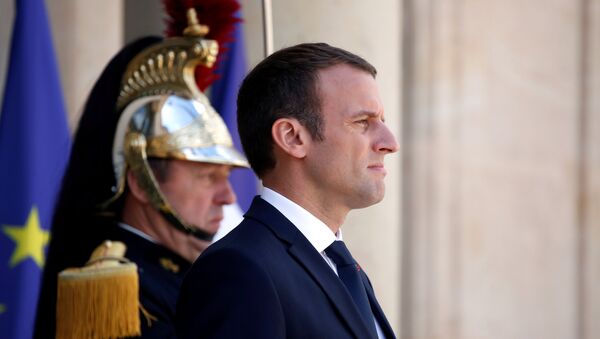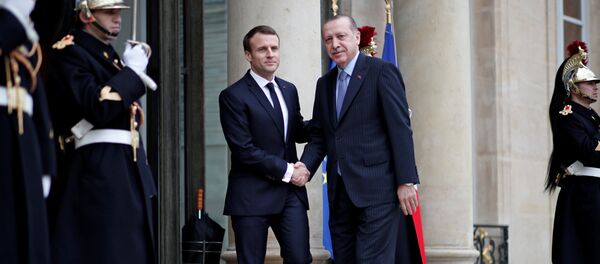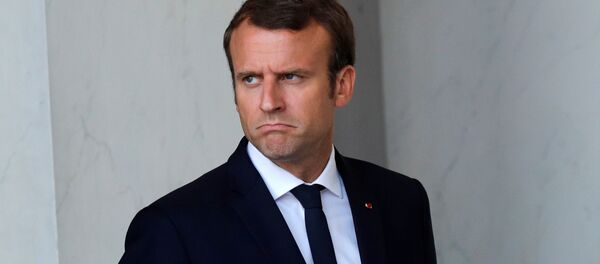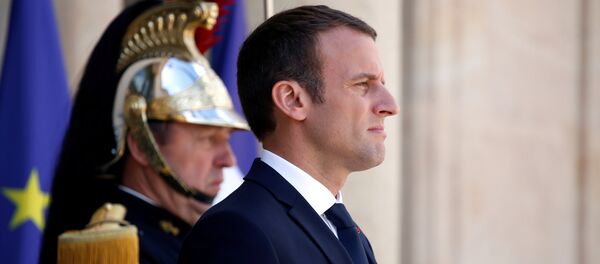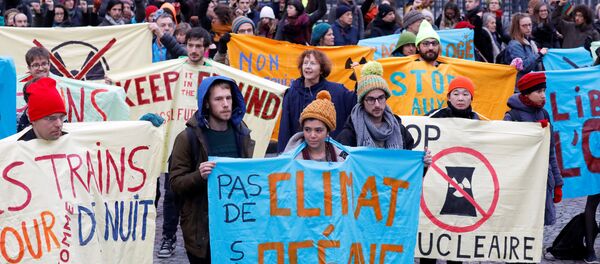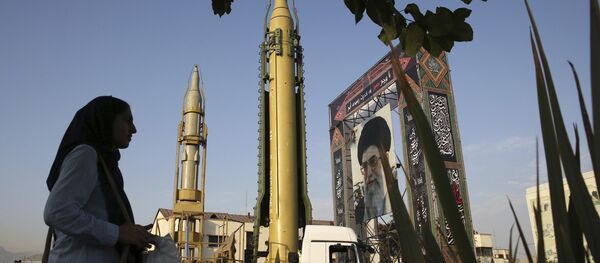Former economic minister under ex-President Francois Hollande, former banker at Rothschild & Cie Banque, in April 2016, Macron left the government to form his own political party, called En marche (later, La Republique en marche, "Republic Onward"), which claimed to put an end to French traditional right-left political cleavage. With no established political party and having never held an elected office, Macron became president one year after.
READ MORE: France's Macron Says Trump's Jerusalem Move 'Regrettable'
Unlikely Winner and Record High Abstention
Macron was not seen as a likely winner of the presidential race, with former French Prime Minister Francois Fillon leading the polls. But a media scoop accusing Fillon of fraudulently employing his wife cost him the presidential seat. Other potential candidates stepped out of the presidential race early, leaving Macron with high chances to enter the Elysee Palace. Nicolas Sarkozy dropped out after the defeat in the primaries, so did Manuel Valls, who was outstripped by Benoit Hamon in the primaries of the socialist party.
His victory, however, was marked by an unprecedented level of abstention, with one in four voters refraining from casting their ballots. The "vote for Macron" has largely become a "vote against Marine Le Pen" rather than a vote to support the former banker, coming from his newly concocted political party and not any reputed political family the French are familiar with.
READ MORE:'Godmother': Brigitte Macron 'Baptises' Baby Panda (VIDEO)
The abstention rate reached 26 percent and the runoff saw a significant increase in the so-called white votes, the ballots left empty. This put the credibility of the new president under question, as in order to have real power and be able to implement his reforms he needed the majority in the National Assembly, the upper house of the French parliament. In June’s parliamentary election LREM party gained a large majority, allowing Macron to put in place measures which proved to be rather unpopular with the French citizens and provoked a range of mass protests in autumn, and saw Macron’s approval ratings drop rapidly.
Labor Law Reform Won Bet for Emmanuel Macron
The major reform in Macron’s program was changing the French labor code. The reform was aimed at liberalizing the labor market, tackling high unemployment and putting French legislation in line with the European one, notably German. It replaced the existing agreements of industries (accord of the branches) with the agreement of enterprises, meaning that every employer could now negotiate the salaries and the working hours with its employees, without the need to look back at the industry’s regulations. This major change is seen by the labor unions as depriving workers of their rights and weakening the role of their representatives.
READ MORE: Macron's Right: Africans Really Are Enslaving Other Africans, But There's More
"The most important thing is the labor law, without doubt. It was a test whether he would be able to pass this labor law, or have people on the streets. Here he clearly gained a point. It is an incontestable victory, even given the disagreement of certain syndicates, he was able to pass it. Contrary to Manuel Valls and the previous government, there were strong consultations with labor unions, which allowed passing it without enormous street protests. There were other laws, like regulations for the National Assembly, for example. It’s important, now the deputies have to declare their salaries etc. But the real test was the labor law," Daniel Boy, a senior researcher at the Sciences Po research center (CEVIPOF), told Sputnik.
President of the Rich
"Tax policy must favor investment not rent. I am not against success, but it must not be of those who get richer while they sleep. Those who work must see the fruits of their labor and I don't see why one should be generous to taxpayers who know how to invest their money very opportunistically," Hollande said, criticizing the politics of his former minister.
Macron himself has repeatedly rejected such accusations, saying that the country’s prosperity is equally based on that of successful businessmen. "For our society to get better, we need people who succeed. We shouldn't be jealous of them, we should say: ‘fantastic’," Macron said in his televised interview on October 15.
READ MORE:Swine-dled! Macron's Lucky Escape From Wild Boar Encounter in Sweden
Experts, however, tend to see this as an alarming sign.
Some other social reforms of Macron include the planned rise in the general social contribution tax (CSG) that aims to offset the budget deficit, abandoning unemployment insurance and reducing subsidized employment contracts.
Budget Cuts
Macron has announced numerous budget cuts, calling for all the ministries to reduce their spending in order to curb the 2018 budget deficit.
Lift of the 2-Year State of Emergency and Anti-Terror Bill
Since the deadly terror attacks of November 2015, which took 130 lives, France has been living under a state of emergency. The military personnel have been increased, with special operation Sentinelle soldiers surveying transport hubs and public venues. Emmanuel Macron pledged to lift the two-year state of emergency, inscribing some of its elements in common right instead.
"We must exit the state of emergency. It was efficient in the first weeks, first months after the terror attacks … But it cannot be prolonged indefinitely. Our challenge is to efficiently protect the French people against the permanent terror threat in the framework of the common right. The measures of this law are meant to be of limited amount and are targeted, proportional and linked exclusively to the purposes of prevention and fight against terrorism," Macron said in the European Court of Human Rights in Strasbourg on November 1, when the state of emergency in France was lifted.
READ MORE: Macron Announces Plans of ‘Military Action’ in Libya
However, the bill did not face major popular opposition, which, as CEVIPOF researcher Daniel Boy believes, is due to the fact that the terrorist threat is more present as ever and security stays one of the major concerns for the French.
"The anti-terror bill apparently went well. We saw some protests but I find them rather modest, even the ones staged by the left parties. It’s true that this law is criticized by some as violating personal freedoms, but it was passed rather easily. The French are usually demanding as far as security is concerned, they are not too touchy about the risks of limiting individual liberties, because security is really something crucial," Boy said.
Advocacy for Climate
READ MORE: Macron's African Tour: Fresh Start or 'Colonial' Business as Usual?
Emmanuel Macron has also come up with the initiative to bring US climate scientists to continue their work in France after US President Donald Trump withdrew from the Paris accord on combating climate change in early June. The French leader launched a website called "Make Our Planet Great Again" offering four-year grants to US researchers, teachers and students to continue their work in France. Macron's policies have, however, been criticized by French NGOs facing financial cuts amid the drive to reduce France's budget deficit.
"What we denounce is the divergence between the big discourse of Emmanuel Macron, which plays a leader on the international scene in the questions of climate, and the reality of the budget cuts that have been announced," Oxfam's Clara Jamart said, citing the "impossible decrease in financing" which the NGOs in France are currently facing.
First French President to Speak English
Macron’s perception as the representative of France on the international arena is rather positive. The young president, who’s been very active organizing foreign trips and encounters, is trying to re-establish France’s role as diplomat and mediator.
"He is considered, according to many polls, to be a president who represents France abroad well. He is extremely active in this regard. And he is the first French president to speak English, and it facilitates things greatly. During international reunions, everything that happens "off the record" without interpreters – neither Hollande nor Sarkozy could speak English with any other states of the EU. All the European leaders speak English but French never did, and it was a real problem. He attributes great importance to international agenda, and the French appreciate it, he has a real stature. His image as a representative of France on the international arena is very positive," Boy said.
But researcher Alain Policar believes that Macron’s ambition is groundless since France does not have an important political weight to influence major international conflicts.
"The question is, can France do much at the international level? It can be the fifth world economy, it has the right of veto in the UNSC, but it doesn’t have a weight in the orientation of the biggest world conflicts or the economic policy of the EU. Politically it doesn’t weight a lot anymore. Macron is more charismatic, he has more stature than his predecessors, he speaks English, is intelligent, it’s not bad for an image of the country, but it’s not that important either." the experts told Sputnik.
The main challenge on the international agenda for Macron will be driving French policies in line with the EU requirements, something that Macron promised during his election campaign, according to Daniel Boy.
This includes reducing the budget deficit, bringing military spending to 2 percent of GDP and reducing unemployment.
"The main problem is Europe and globalization, it’s a fundamental and complicated problem – how to adapt French public policy to international and European regulations. Last example is glyphosate, with France willing to abandon it, and Europe disagreeing with it, notably Germany. What all the presidents and prime ministers in the past had to deal with is this discrepancy with the politics of the EU," Boy added.
Pension and Education Reforms Can Result in Mass Protests in 2018
After a significant drop in approval ratings in September, Emmanuel Macron is regaining popularity, which, according to an IFOP survey published on December 17, has grown by 10% over the past two months. Over half of French citizens endorse Macron's activity as the country's leader in December.
"The planned pension reform is huge. Currently pensions differ for the officials, for every category – we have almost 30 different pension categories and he said during his campaign he wanted to pass to a unique system. Here he will face a lot of obstacles and a very high risk of manifestations," Daniel Boy said.
Under the education reform, the new selection process will allow universities to select students and "reorient" those less suitable for the program to other establishments.
"Second thing [after pension reform] that risks fueling a massive social movement is university selection. It’s a taboo in France," Alain Policar explained. adding that it is uncertain how far the reforms will go.
The expert stressed that such pre-selection will lead to the emergence of "universities of excellence" like in the United States, and diplomas will no longer have the same value and will be based on the place where they were obtained.

